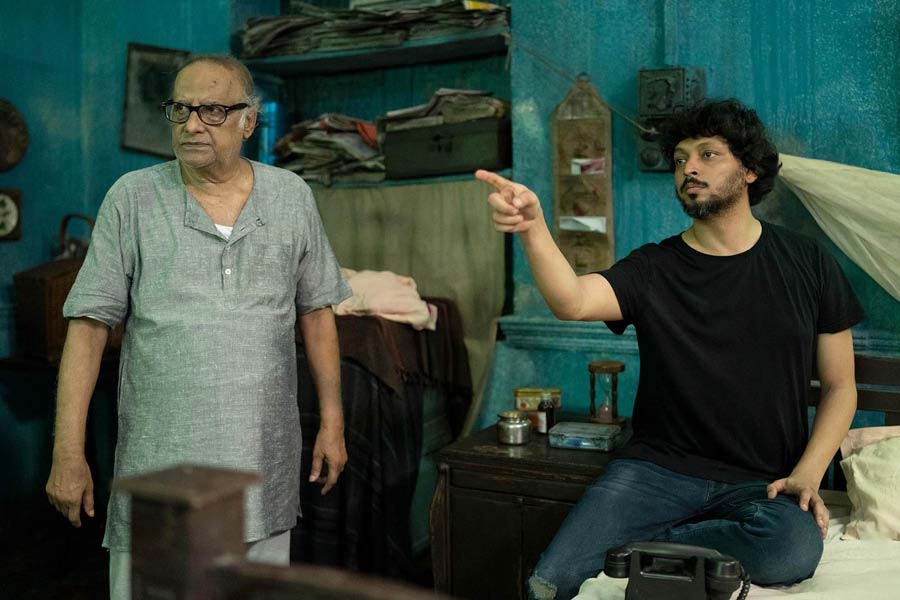He wakes up to a nightmare involving the TV’s static or white noise in what is an astonishing opening sequence. He goes to sleep in the film’s heart-breaking final shot, whispering to himself how he loves the TV’s ‘jhijjiri’ (what a beautiful word this is for a TV’s static, drizzling on the senses like a burst of unseasonal rain). Bookended by these two drastically different scenes lies Samik Roy Choudhury’s stark, often profane and outrageous, always riveting exploration of the loneliness of the human condition.
What a pleasure it is to write about a film whose story you cannot put down in a few words, a film that defies categorisation. A film that keeps teasing you with the way it unfolds, always a step ahead of you and consistently surprising you with its trajectory, shifting in and out of the realms of fantasy and reality. A social satire, a black comedy, a psychological thriller, an exposé of our inherent voyeurism, a meditation on loneliness – Beline is all of this and more.
The film is interestingly set at a time when the mobile phone hadn’t become as ubiquitous, and the landline was still around, as also TVs that had not gone the smart and LED route. Paran Bandopadhyay stars as your regular old man. He lives alone (just watch the precision, the economy with which Samik establishes the character’s daily routine in a series of short, sharp shots). Enjoys a game of Ludo with his neighbours (another masterfully shot sequence that also establishes the character’s world view as he, when a new entrant to the group speaks of chess as being the game to play, elucidates why after a lifetime of thinking and fretting he now prefers the random chance that Ludo offers). Is not averse to peeping over his newspaper to catch a glimpse of the house help’s curvaceous body. And has the daily soap ‘Sati’ (nice touch that title) as his everyday entertainment fix.
Things take a turn with a cross connection – involving a young woman and her live-in partner – that were rather common at one point in our telecom history but not so much in the era in which the film is set (that’s one of the film’s intriguing bits). He slowly gets drawn into the life of the young couple.
This is where the mind games begin. Because simultaneously you see the soap opera unfold on the telly, where the same young couple are the protagonists (in fact the couple’s quarters resemble the spaces we normally see in TV serials). For the rest of the narrative – as he keeps listening in on the conversation for three days at a stretch! – you never quite know what’s real or what is simply the product of a man losing touch with reality.
To the credit of the director, he never makes it clear, instead drawing us into the labyrinthine workings of the psyche of a lonely man. At the same time, the relationship between the couple is an indictment of the toxicity and easy violence that characterises most such contemporary relationships.
As I mentioned earlier, Beline is not a film one can describe easily in words. One needs to experience it. Take, for example, the final shot of the cockroach making its way across the floor, a stroke of genius playing on the common notion that only cockroaches will survive a nuclear fallout that is open to interpretation.
Samik has an unerring eye for the absurd, which is why the essentially dark film abounds in almost farcical humour. Just watch the old man sitting on the commode listening in on the couple making out, with the girl’s orgasmic breathing offering an uproarious contrast to his bowel movement. It is outrageous but give me one Bengali film in recent years that has managed to think this out of the box.
The director has a wonderful sense of cinematic space too (apparent in the way he composes the phone conversations the old man has with the TV mechanic or the officer at the police station) so that though almost all of the film is set indoors within the confines of two rooms, there’s nothing static about the narrative.
Apart from the cinematographer (Supriyo Dutta) and editor (Sanglap Bhowmick), much of the credit for that goes to Paran Bandopadhyay. Here is an actor who can give even the dullest of scripts a spark by his mere presence. Yet, despite what he brings to a film, he has seldom had a role he could sink his teeth into. There is Suman Ghosh’s Peace Haven or Avijit Sen’s Tonic, or the recent Shri Swapankumarer Badami Hyenar Kobole.
Beline is probably the role the actor was born to play. It’s a performance that literally takes your breath away. Paran can do wrong with the many close-ups that he has, his face a picture of lust as he eavesdrops on the couple making love, the pain that suffuses his visage at the brutality the man unleashes on the woman, the mischievous twinkle in his eye at the possibilities the conversations he is privy to hold, and the sheer melancholy of his final words about the TV’s static being so comforting.
In the creatively barren landscape that is contemporary Bengali cinema, Beline is well worth dialling in.
(Shantanu Ray Chaudhuri is a film and music buff, editor, publisher, film critic and writer)










